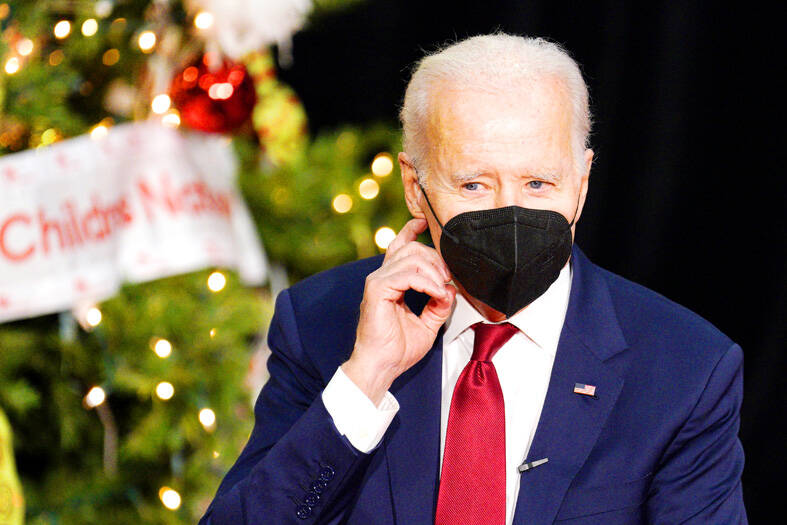Taipei yesterday lauded the US for a newly eneacted defense spending bill, while China panned the legislation, which would boost military assistance for Taiwan.
US President Joe Biden on Friday signed the US$858 billion defense bill into law, authorizing up to US$10 billion in security assistance and fast-tracked weapons procurement for Taiwan.
It also includes about US$45 billion more than Biden had requested, as lawmakers looked to offset inflation and boost the nation’s military competitiveness with China and Russia.

Photo: EPA-EFE
In the Indo-Pacific region, the legislation authorizes increased security cooperation with Taiwan and requires expanded cooperation with India on emerging defense technologies, readiness and logistics.
In Taipei, the Ministry of Foreign Affairs in a statement thanked the US Congress “for showing the great importance it attaches to Taiwan-US relations and strengthening Taiwan’s security.”
The Ministry of National Defense also thanked Washington for the legislation, saying it showed the importance the US attaches to its ties with Taiwan and bolstering the nation’s security.
Taipei is to discuss the details of the act with Washington and “gradually push forward the budget formulation and actual disbursement of the various Taiwan-friendly provisions,” the defense ministry said.
Meanwhile, the Chinese Ministry of Foreign Affairs said in a statement that the US defense bill “severely affects peace and stability across the Taiwan Strait.”
“The case ignores the facts to exaggerate a ‘China threat,’ wantonly interferes in China’s internal affairs and attacks and smears the Chinese Communist Party, which are serious political provocations to China,” the statement said.
The US is Taiwan’s most important international backer and arms supplier, despite the absence of formal diplomatic ties.
Taiwan’s military is dwarfed by that of China. Its air force in particular has come under strain from having to scramble repeatedly to see off Chinese incursions near the nation over the past couple of years.
Separately, the defense ministry yesterday reported that 11 Chinese military aircraft and three naval ships had been detected near Taiwan between 6am Friday and 6am yesterday.
Taiwanese fighter jets were deployed to warn the Chinese aircraft, and air defense missiles were deployed to monitor the activities, it added.
China in August staged major military exercises around Taiwan proper, after US House of Representatives Speaker Nancy Pelosi visited Taipei.

AIR SUPPORT: The Ministry of National Defense thanked the US for the delivery, adding that it was an indicator of the White House’s commitment to the Taiwan Relations Act Deputy Minister of National Defense Po Horng-huei (柏鴻輝) and Representative to the US Alexander Yui on Friday attended a delivery ceremony for the first of Taiwan’s long-awaited 66 F-16C/D Block 70 jets at a Lockheed Martin Corp factory in Greenville, South Carolina. “We are so proud to be the global home of the F-16 and to support Taiwan’s air defense capabilities,” US Representative William Timmons wrote on X, alongside a photograph of Taiwanese and US officials at the event. The F-16C/D Block 70 jets Taiwan ordered have the same capabilities as aircraft that had been upgraded to F-16Vs. The batch of Lockheed Martin

US President Donald Trump yesterday announced sweeping "reciprocal tariffs" on US trading partners, including a 32 percent tax on goods from Taiwan that is set to take effect on Wednesday. At a Rose Garden event, Trump declared a 10 percent baseline tax on imports from all countries, with the White House saying it would take effect on Saturday. Countries with larger trade surpluses with the US would face higher duties beginning on Wednesday, including Taiwan (32 percent), China (34 percent), Japan (24 percent), South Korea (25 percent), Vietnam (46 percent) and Thailand (36 percent). Canada and Mexico, the two largest US trading

GRIDLOCK: The National Fire Agency’s Special Search and Rescue team is on standby to travel to the countries to help out with the rescue effort A powerful earthquake rocked Myanmar and neighboring Thailand yesterday, killing at least three people in Bangkok and burying dozens when a high-rise building under construction collapsed. Footage shared on social media from Myanmar’s second-largest city showed widespread destruction, raising fears that many were trapped under the rubble or killed. The magnitude 7.7 earthquake, with an epicenter near Mandalay in Myanmar, struck at midday and was followed by a strong magnitude 6.4 aftershock. The extent of death, injury and destruction — especially in Myanmar, which is embroiled in a civil war and where information is tightly controlled at the best of times —

China's military today said it began joint army, navy and rocket force exercises around Taiwan to "serve as a stern warning and powerful deterrent against Taiwanese independence," calling President William Lai (賴清德) a "parasite." The exercises come after Lai called Beijing a "foreign hostile force" last month. More than 10 Chinese military ships approached close to Taiwan's 24 nautical mile (44.4km) contiguous zone this morning and Taiwan sent its own warships to respond, two senior Taiwanese officials said. Taiwan has not yet detected any live fire by the Chinese military so far, one of the officials said. The drills took place after US Secretary